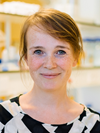European grant worth millions awarded to UG academics
Five University of Groningen researchers have been awarded an ERC Starting Grant: Marthe Walvoort, Marcos Guimaraes, Julia Kamenz, Sandy Schmidt, and Robert Prey. The European Research Council (ERC) awards these personal grants, each worth €1.5 million, to outstanding researchers with the aim of stimulating ground-breaking research in Europe.

Marthe Walvoort
Stratingh Institute for Chemistry, Faculty of Science and Engineering
In the ‘Sticky Sugars’ project, Walvoort will investigate the impact of bacterial glycoproteins on the process of bacterial adhesion and infection. Using the power of chemistry and enzymes, she will develop novel techniques to directly visualize the sugars on the outside of bacteria, and in collaboration with researchers from the Groningen Biomolecular Sciences and Biotechnology Institute (GBB) and the University Medical Center Groningen (UMCG), she will unravel the contribution of these sugars to bacterial infection. This project will inspire novel antibacterial therapies based on attacking bacterial sugars.

Marcos Guimaraes
Zernike Institute for Advanced Materials, Faculty of Science and Engineering
In his ERC project, Guimaraes will use atomically-thin two-dimensional materials to combine highly efficient magnetic devices with optical communication. The fast development of modern information technology requires smaller devices consuming less energy. Magnetism provides an excellent route for energy-efficient devices, such as hard-disk drives, but they are often slow. Moreover, magnetic information has to be converted into electric currents for it to be transmitted, leading to more power consumption.
Specifically, Guimaraes aims to integrate magnetic devices with a laser that can convert magnetic information into optical information, i.e. light polarization. This project will pave the way for new generations of information technologies, addressing fundamental aspects along the way.

Julia Kamenz
Groningen Biomolecular Sciences and Biotechnology Institute (GBB), Faculty of Science and Engineering
Life on earth is rhythmic—from our heartbeat, to the circadian day-night cycle, to the oscillations in animal populations. But what actually drives these clock-like behaviours? In her ERC project, Julia Kamenz will dissect the molecular mechanism of one of the most fundamental biological clocks: the cell cycle clock, which underlies and drives cell divisions. Like a watchmaker, Kamenz and her team plan to isolate the individual parts of the cell cycle machinery and systematically assemble them into a ‘ticking’ cell cycle clock. This approach will allow the researchers to reveal the intricate interactions between each of the parts and provide novel insights into the biochemistry of cell division.

Sandy Schmidt
Groningen Research Institute of Pharmacy (GRIP), Faculty of Science and Engineering
In her ERC project ‘RECNNSTRCT’, Sandy Schmidt will reconstruct enzymes for novel nitrogen-nitrogen bond-forming chemistry. Compounds containing nitrogen-nitrogen (N-N) bonds are highly important and frequently found in diverse pharmaceuticals, dyes, agrochemicals, synthetic materials, and cosmetics. However, traditional chemical procedures to synthesize these N-N bond-containing compounds are often difficult to realize, costly, and environmentally unfriendly.
Schmidt’s ERC project will address this challenge by developing novel enzymes that can form these important N-N bond-containing compounds in a more sustainable way, while tackling reactions that are difficult to realize by traditional chemical approaches and currently not feasible by enzyme catalysis.

Robert Prey
Faculty of Arts
In the last two decades, social media channels and streaming services such as Spotify have drastically changed the music industry. Artists use these platforms to reach their audience and these platforms turned out to be the best way for many artists during the COVID-19 pandemic to draw attention to their music.
In his research project ‘PlatforMuse’, Robert Prey will research how social media and streaming services influence the creativity, identity, and working conditions of musicians, and what kind of influence musicians in turn have on the development of these platforms. The project will show how culture in general, and the music industry specifically, is influenced by the ‘platformization’ of our society.
More about ERC
ERC supports talented young researchers in setting up a research team and starting an independent research project. An ERC grant enables these researchers to start bold, groundbreaking research and thus open up new avenues in their field of study.
More info
- Read more about Robert Prey
- Read more about the projects by Marcos Guimarães, Julia Kamenz, Sandy Schmidt en Marthe Walvoort
| Last modified: | 24 November 2022 09.52 a.m. |
More news
-
10 June 2024
Swarming around a skyscraper
Every two weeks, UG Makers puts the spotlight on a researcher who has created something tangible, ranging from homemade measuring equipment for academic research to small or larger products that can change our daily lives. That is how UG...
-
21 May 2024
Results of 2024 University elections
The votes have been counted and the results of the University elections are in!
